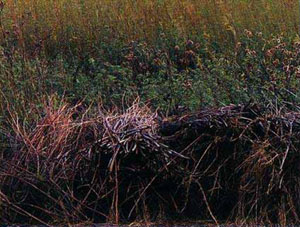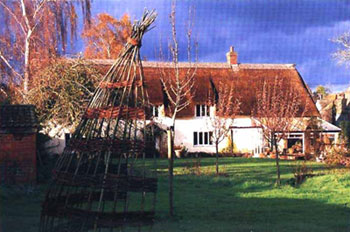
The willow beds where herons and skylarks live.
The deep growing willow roots can yield multiple stems for 30 years, and these are cut to the ground every year. It was a back breaking and time consuming job for the men who cut them by hand. It could take three weeks to clear two acres and involved being bent double with a hook to hack each stem. Nowadays, with machinery, two acres can be cut in a day.
"We grow a number of different types of willow," explains James. 'some for the upright sticks for the hurdles, and others for weaving. Salix triandra "Black Maul" is an old variety that used to be very popular for basket weaving and we are also experimenting with new hybrids." The colour varies, and the bark is greener when freshly cut and is used straight away to make hurdles. The rest is tied into bundles, using a knot made with a willow stem, and left outside to dry. The bundles are stored inside and soaked in warm water for five days to make the stems more pliable before use as hurdles.
The workshops are stacked with sheaves of withy and with work in progress and finished hurdles, all in soft hues of chestnut, mossy greens and auburns. Jay Davey works on designs for the garden furniture and hurdles as well as helping to realise customers" own ideas. The hurdles are woven on upright jigs, up to ten strands of willow being woven at a time. Each hurdle maker has a different style; customers can choose their preferred style and their order is then made up by that hurdler. Willow sculptor Serena de la Hay makes huge withy creatures: horses switching their tails, racing greyhounds and geese that fix you with a goosey eye.

The ancient thatched farmhouse is still the base for English Hurdle.
The Hectors have more recently turned to the innovative technique of erosion control. Willow has a unique capacity to burst back into growth when the cut stems are placed back in the soil. These upright shoots can be placed side by side (known as spiling) and then woven together.
As they shoot and burst into leaf and the strong roots spread densely, the river banks on which they are planted are protected from erosion.
English Hurdle, Curload, Stoke St Gregory, Taunton, Somerset TA3 6JD. Tel: 0 1823 690109. Living hedging rolls retail at f41 for 2 by 2 metres. Website: www.hurdle.co.uk

